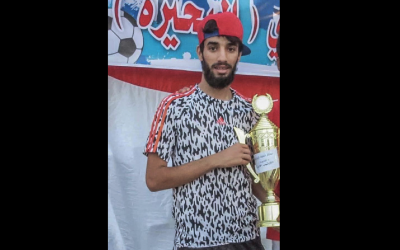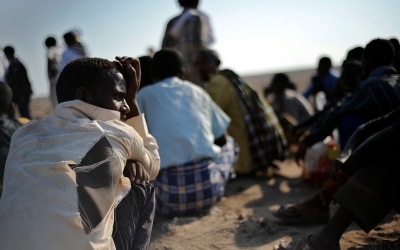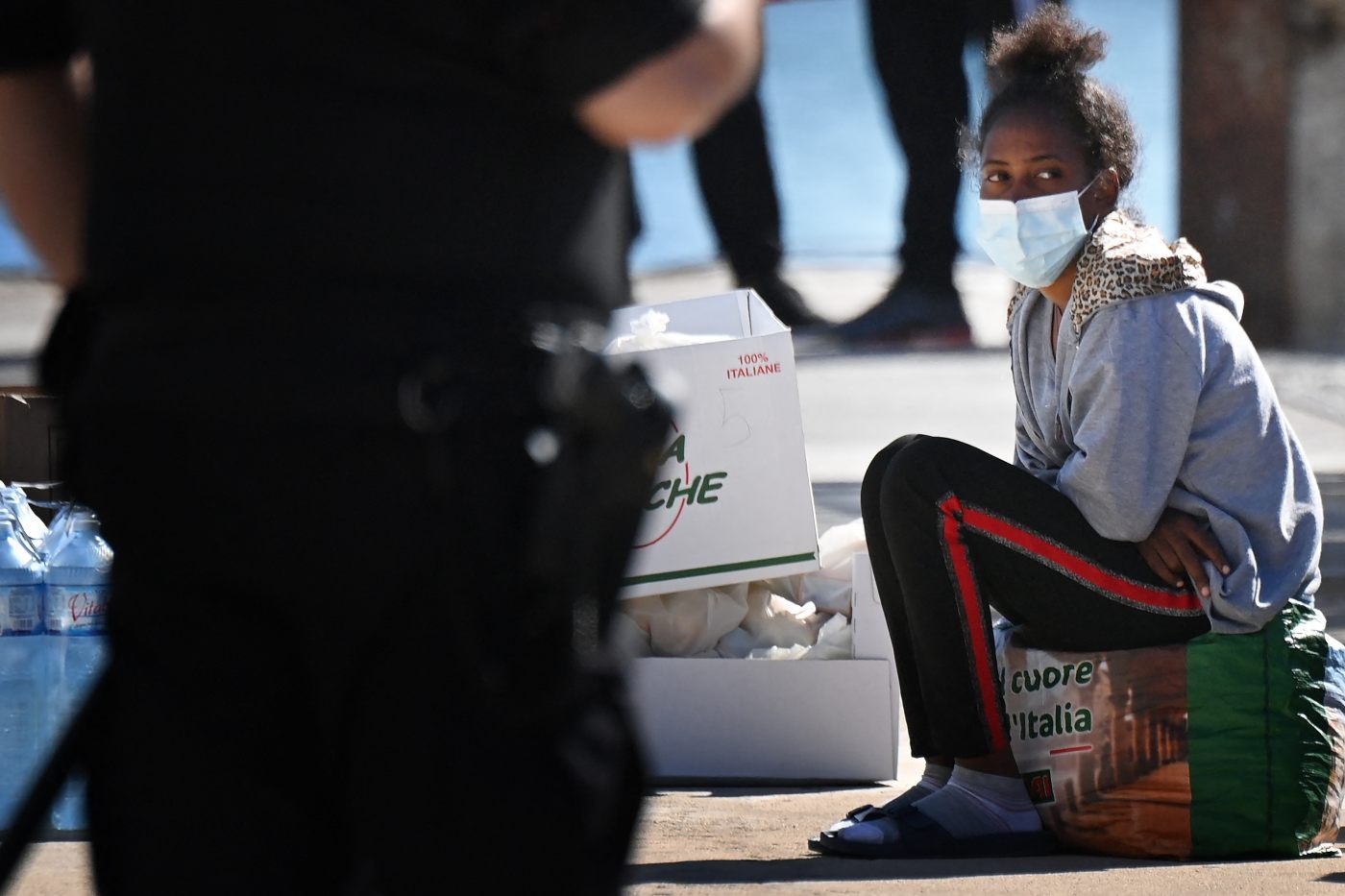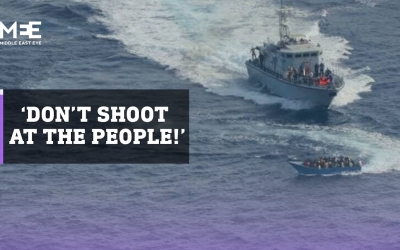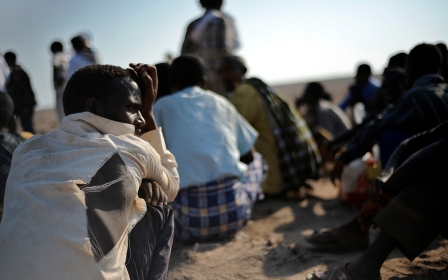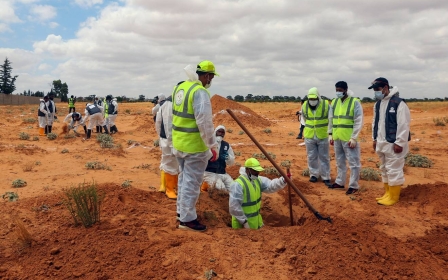Imprisoned Libyan footballers highlight Italy’s criminalisation of refugees

Every Friday morning, Joma Tarek Laamami awaits a video call from his family back in Benghazi, Libya, the country he left in August 2015 when he was 20 years old.
Laamami is in Syracuse, Sicily, where he has spent the past six years in prison, since the day he arrived in Italy. He sits inside a room in the prison where family calls are allowed once a week. On screen, Laamami greets his young nieces, who are well dressed for Friday's family gathering.
“He speaks Italian, works, studies, does sport… but his life sometimes seems to have ended,” his mother, Suad, tells Middle East Eye. In her house in Benghazi, she proudly collects his football shirts, school diploma and pictures with the football team and fans.
“Tarek was loved by everyone who knew him. He’s someone who always smiles, even when he’s sad,” she adds.
As a footballer playing in his local team, Tahadd Benghazi, Laamami escaped the war in Libya in 2015 and had hoped - along with three of his teammates, Alaa Faraj (known by Italian authorities as Abdel-Karim Hamad Faraj), Abdel Rahman al-Monsif and Mohannad Nuri - to find a better future in Europe and follow his dreams to one day play for a German team.
But tragedy struck the precarious wooden boat transporting the footballers and other people from Zuwara, Libya, towards Italy when 49 people died of asphyxiation in the cargo hold.
Witnesses on the boat blamed Laamami and the other Libyan footballers for the deaths, accusing them of preventing the people locked inside the hull from going outside.
The men have denied all wrongdoing, saying they were only passengers, like the other victims, and were not tasked with maintaining order.
One of the other men accused, Tunisian citizen Chouchane Mohamed Ali, admitted to having sailed the boat, but he denied there was a crew, or that the other accused had any pre-ordained role on board.
On 2 July 2021 an Italian court rejected an appeal and sentenced the four Libyans and Ali to 30 years in prison for human trafficking and murder.
Ever since they were first imprisoned, relatives and friends have organised peaceful demonstrations in Benghazi, calling on the Italian authorities to release the footballers.
Laamami is one of more than 2,500 undocumented people arrested in Italy since 2013 for allegedly sailing boats across the Mediterranean, according to a new report, From Sea to Prison, issued by a number of refugee NGOs and drawing on police data and evidence from hundreds of jail sentences.
Crackdown on ‘boat drivers’
Using anti-mafia laws designed to combat international criminal organisations, Italy arrests and imprisons people who sail boats carrying people seeking refuge in Europe, accusing them of being smugglers. But these people are often victims of the trafficking organisations themselves, either forced to steer the vessels or coerced into doing so as a means of paying for their journey to Europe.
At least 20 of the cases studied in From Sea to Prison resulted in prison sentences of more than 20 years, while seven others involved life sentences. In some instances, judges condemned the accused without fulfilling even basic legal procedures, such as providing an opportunity for them to be identified by the witnesses in court.
Laamami and his footballer friends have never been identified in court in the presence of a judge by the witnesses who accused them of responsibility in the deaths. Only nine out of the 313 passengers on board have given testimony to the Italian authorities, six years after the 49 died.
The report, says Germana Graceffo, a legal expert specialising in immigration, “represents the clear failure of migration policies”.
One of the focal points of the report is a distinction often disregarded by the Italian justice system - as well as the media - about the different types of boat "drivers", a number of whom are coerced by traffickers, or otherwise led by necessity - with the promise of letting relatives board the vessel for free, or in the face of choppy seas - into captaining the boat. But regardless of their actual position of responsibility on board, these drivers can end up being held legally responsible if there are several deaths en route.
According to data in the report, 35 percent of the accused boat drivers are from North Africa, 21 percent from Eastern Europe, 20 percent from West Africa and under 4 percent each for East Africa, Turkey and Middle Eastern countries.
The report adds that Italian police often make rushed assumptions on who is guilty of trafficking based on the colour of people's skin or perceived origin - with North Africans more likely to be viewed as the traffickers and sub-Saharan people as the victims. Identical charges in a large number of trials show how the context and singularities of the journeys in extremely precarious conditions are often not taken into account, the report argues.
From Sea to Prison pointed to a number of failures of the legal and penal system, some of which Laamami and the other Libyan footballers experienced themselves: the lack of professional translators for the accused, leaving room for misinterpretation; or a lack of investigation into the dynamics on board the migrant vessels, with only a small number of passengers being questioned. Moreover, the identification of alleged perpetrators is often made through grainy black-and-white photographs instead of in person.
Once the alleged boat drivers are brought to court, public defenders are often not invested in their clients’ cases. Laamami witnessed this first-hand, when the public defender in charge of his case asked for five minutes in court to read the documents of the trial.
“How could he argue without having studied them all the night before?" Serena Romano, the lawyer Laamami later nominated following the appeal court’s sentence, told MEE.
'I spent two years in prison just because I helped drive the boat, and for seven months I didn't see a lawyer'
- Cheikh Sene, Senegalese fisherman
Cheikh Sene, a Senegalese fisherman who left his country because of the fishing crisis and crossed the Mediterranean from Libya, is part of the team that worked on the research for the report.
“I spent two years in prison just because I helped drive the boat, and for seven months I didn't see a lawyer. When I saw him, he didn't speak my language,” he tells MEE. “Today, people who know they will be arrested no longer help drive the boat, and this increases the risk of deaths at sea.”
This fear, in effect, means that many of the overcrowded boats are essentially at sea without anyone in charge.
The report states that while Italy has been criminalising undocumented migration for over a quarter of a century, this push has increased since 2015, with laws adapted to further crack down on people migrating.
“What needs to be reconsidered,” says immigration lawyer Graceffo, “is the Italian legal framework that puts those who manage and organise the traffic on the same level as their victims.
“This does not prevent deaths at sea, which are a direct consequence of the lack of a legal route to Europe,” Graceffo adds. “Criminalisation... on a judiciary level hides Italy's failures in the fight against criminal organisations, and on a political level diverts attention from Italy's real responsibilities in human trafficking.”
Even when prisoners are acquitted due to a lack of evidence, the economic and social hardships experienced by ex-prisoners leave them in limbo, despite the fact that they are entitled to compensation from the Italian state for the time they spent in unjust detention and yet they might not be adequately informed of their rights, or face bureaucratic obstacles.
‘He was not on a cruise ship!’
“The trial was a farce,” Romano, Laamami’s lawyer, told MEE.
She added that the trial should have not even have proceeded without formal permission from the Italian Minister of Justice to prosecute cases of alleged murder or manslaughter that took place in international waters, outside Italian territory.
Instead, the Libyan footballers were tried for aiding and abetting illegal immigration, which does not require any further permission. Even though the life stories of the four men, and the fact they had paid for the journey, were acknowledged, the court nonetheless concluded that they were recruited by the criminal organisation and they then deliberately trapped the 49 people in the cargo hold.
Carmelo Zuccaro, the public prosecutor in the Sicilian city of Catania, did not reply to an MEE request for comment by the time of publication. But back in 2020, he told the Italian newspaper Corriere della Sera that the trial “had nothing to do with young footballers”.
“They were condemned, not only for being in command of the boat, but also for murder,” Zuccaro said at the time. “The 49 migrants... were mercilessly left to die; the hatchway was bolted so as to not let them on deck. One of the most brutal episodes ever recorded.”
But according to Romano, many unclear elements collected in the testimonies after the shipwreck do not show what really happened on the boat.
“If Tarek was next to the door of the cargo hold under which 49 people died, does that mean he was responsible for their deaths?” she asked. “And if he prevented someone from getting out of that hatch - and we don’t know even if it was possible to open it - did he not do so in extreme circumstances in which any movement of the people could have caused the capsizing of the boat and the death of all? Tarek might have acted out of survival instinct - he was not on a cruise ship!”
Romano went further, and said that none of the witnesses who testified in the case said they had prior knowledge of there being people in the cargo hold, meaning those found dead inside the vessel could have succumbed in the very first hours of the journey on the Libyan coast, locked in before hundreds of other migrants were taken on board.
“I don’t know how the court of cassation could have confirmed that sentence,” Romano said. She is still looking for other passengers who could reveal what happened on the boat, while simultaneously trying to appeal to the European Court of Human Rights (ECHR).
Meanwhile, Laamami and his companions remain in prison.
Before the court passed sentenced Laamami had dyed his hair blond. Perhaps he was expecting to be freed and wanted to celebrate.
“As I told him that the sentence had been confirmed, he clung to me and cried like a child,” Romano told MEE. “They killed their hopes and this trial cries out for justice.”
This article is available in French on Middle East Eye French edition.
Middle East Eye delivers independent and unrivalled coverage and analysis of the Middle East, North Africa and beyond. To learn more about republishing this content and the associated fees, please fill out this form. More about MEE can be found here.


